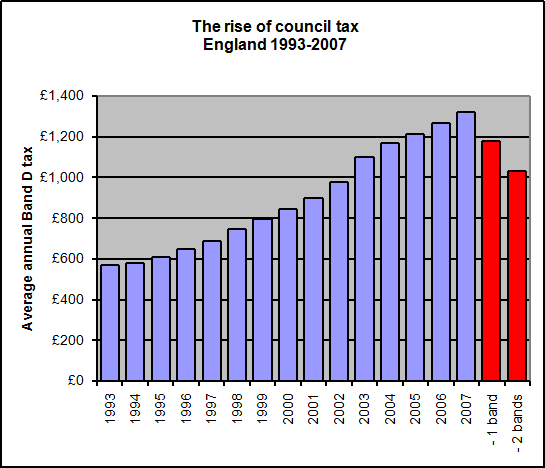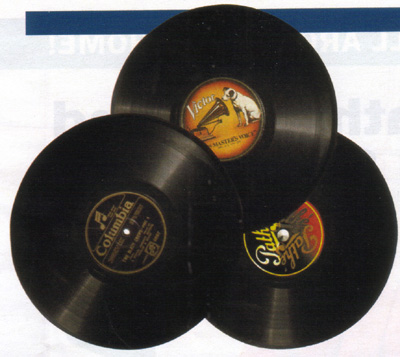
Some people in England and Scotland could cut their council tax by getting their home moved down at least one band. That would take the tax back to where it was in 2004 – or close to 2002 if you get a two band cut. The process is difficult and in many cases of course is not possible. But it is worth a go. It generally won’t work in Wales as all homes were rebanded in 2005.
First thing to do is to check how your tax compares with what your neighbours pay. If you live in a row of similar houses then the chances are they should all be banded the same. You can check this out in England at the valuation office agency website www.voa.gov.uk and click on the council tax link on the front page. In Scotland go to www.saa.gov.uk and put in your postcode.
If some of your neighbours pay less council tax than you have a look at their home and see if you think it should be the same. Remember bands were assessed in 1991 (or when the home was built if that is later) so think how the properties were then. If your band is higher than the band of similar homes nearby then it is worth going on to the next step. But beware that one outcome might be your neighbour’s home is raised to your level rather than the other way around! There is also an outside chance that your home will be re-valued upwards.
Next you should contact your local listing officer in England or the local assessor in Scotland. Find out where yours is www.voa.gov.uk/where/index.htm or www.saa.gov.uk/saacontacts.html. Normally a valuation can only be changed for one of 13 reasons – for example if the property has physically changed or you have moved into it within the last six months. But it will also be reviewed if you have a genuine reason to think it is wrong. Contact your local office and explain your reasons. If you want more evidence before you do that you can use the internet to find a rough valuation of your property at April 1991 prices. That technique is explained at www.moneysavingexpert.com/council.

If your request is turned down there is an appeal process which the local office will explain when it rejects your claim. If you succeed the change should be backdated to the start of council in April 1993. If any banding is increased it only applies going forward.
Wise new OWL
Dusk is falling and I am sitting here in the dark, the heating and
television are off. But it is costing me £520 a year in electricity. A small
monitor sitting on my coffee table shows me minute by minute how much
electricity is passing through my meter. It tells me I am spending 6p an hour
just to sit here doing nothing! I search for the power leak. I turn off my
computer. Should have thought of that! I push buttons to switch the TV and hi-fi
off standby. That barely shows. The fridge! It is always on. And the microwave
has an LED clock. And the cordless phone has a light. I turn them all off. That
brings me down to 2.1p an hour. I get desperate. I turn off the hi-fi and the
computer at the socket – down to 1.2p! I turn off an extension lead which has a
small light on it. My mobile phone charger is plugged in getting warm – out it
comes! The gas boiler light is on – though the boiler is off - but I am nervous
about actually disconnecting that from the socket. Eventually I reduce my
consumption to about 0.5p an hour. I give up. and spend half an hour restoring
settings, correcting flashing clocks and turning on the fridge. It makes me
realise how much of our stuff is very hard to turn off completely.

The OWL wireless energy monitor works by clipping small magnets in a plastic collar round the mains cable from the meter to the consumer unit or fuse box. You can do it yourself without an electrician. The collar plugs into a device you leave by the meter and it transmits your electricity usage continuously to an LCD monitor about 10cm square which you can put anywhere or even carry round with you. I can see that turning on the kettle or the microwave, switching on the electric heater or doing the washing all send it zooming up. You can set an alarm to sound once usage crosses a particular level. The OWL costs £49.95 which includes the six AA batteries it needs (at some point you will have to replace them). But it can save you money and will certainly make you conscious of every watt of electricity you use. More – and useful tips on saving energy – at www.theowl.com.
RPM not RIP
They are heavy, fragile, and crackly. But old 78 rpm gramophone records are
collected and some are worth money. So if you have boxes of old black shellac in
your loft or garage, maybe now is the time to dig them out and dust them off.
David Moore has been collecting 78s since 1961 just after they stopped being
made. "For me it was cheap music, everyone was throwing them out." Now he buys
and sells them through his website www.78rpm.co.uk.
 |
Now David’s interest David is really old records, pre 1920 preferably back to the earliest days – they began in 1898. "Edwardian music hall stars did record and for example Marie Lloyd fetches £10-£20 but one or two that never turn up you would pay a few hundred for. Esther Tilly is another or the greatest Edwardian male start Mark Sheridan." Guide prices on his website indicate that he would pay £40-£75 for Mark Sheridan and up to £100 for Vesta Victoria. Old opera singers can also fetch money. David calls them "Russians with unpronounceable names singing with the St Petersburg or Moscow orchestras. Some jazz and big band of the 20s and 30s are also collected and early rock and roll on 78s is very collectible, especially Elvis of course." But he warns that such items are rare. "What most people have is run of mill stuff. For example there are so many Gracie Fields records around they are almost worthless. Nowadays I rarely find anything I am interested in."
|
But he is always happy to give valuations. Usually he will say ‘rubbish’ but just occasionally he will reach for his cheque book.
Apart from David’s site two others with useful information and links are www.btinternet.com/~bill78/index.htm and www.jabw.demon.co.uk
Credit card deals
The banks want our money and one way they like to get it is to offer great
deals on credit cards and hope that leads us into using the card foolishly and
giving everything we saved back – with interest. But play your cards right and
the good deals can make you money.
If you pay off your card in full every month without you can go for one of the cashback cards. You can get 1% from some and as I write Capital One is offering 4% cashback for the first three months dropping to 1% after that. You will need a good credit record to get it but if you do it’s worth buying everything on the card to get the discount. But never miss a payment. One month’s interest will wipe out any cash back savings.
Alternatively you can take out one of the cards that offers 0% on purchases for a fixed time. Halifax, Barclaycard, and Capital One are all offering 10 months or more interest free purchase. Again use the card for all your plastic spending. But never draw cash out with it as that will cost you money and never exceed your credit limit or you will be fined £12. Take out a direct debit to pay the minimum each month. Let the unpaid balance accumulate – remember you are being charged no interest on that. Keep your receipts and put the money you have spent on the card into a high interest account. Use that money to pay off the credit card balance just before the 0% offer ends. The interest your savings account has earned is pure profit.
Warning: Never try one of these tricks if you have other debt. Pay that off first. And make sure you obey the card rules precisely – any breach will cost you dear.
Pension forecasts suspended
The Department for Work and Pensions has suspended all state pension
forecast for anyone who reaches pension age after 5 April 2010. The service will
be restored in autumn 2008. Until then, women born after 5 April 1950 and men
born after 5 April 1945 will be in the dark about their state entitlement. The
DWP says systems have to be updated to reflect the recent changes in state
pension entitlement. People who reach pension age after 5 April 2010 will only
need 30 years’ contributions to get a full pension and there will be changes in
the way that caring for children and others is counted. More information from
the Future Pension Centre on 0845 300 0168.
 |
Instant clearing delayed This month the banks had promised to introduce virtually instant clearing of money which was moved over the internet or by phone. Now it has been delayed until "the end of May". So for another six months when you press the button or make the call to move money to a different bank it will leave your account at once but not arrive at its destination for three working days. Tip: Only move money on a Monday or Tuesday. Then you avoid the extra two day delay as the system takes its weekend break. |
November 2007